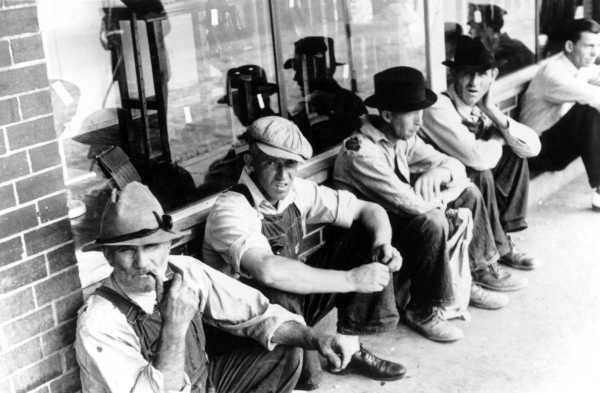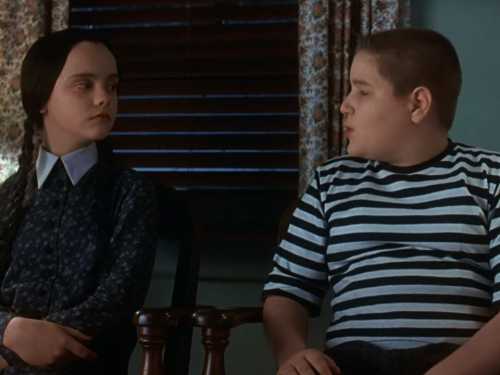
It’s like the old saying goes: “Hard times create strong men, strong men create good times, good times create weak men, and weak men create hard times.”
Actually, as sayings go, this one is not so old. But it is quite true. There’s just one thing I would add: hard times also seem to create happy men, whereas good times create a whole generation of miserable bastards.
Advertisement
I think about my grandfather, Warren. After growing up dirt poor in the Great Depression, he fought in both World War II and Korea. Yet he was the kindest, gentlest man I’ve ever known. We’ve always been solidly working class; my grandfather drove an oil truck before joining the fire department. Yet he was also one of the smartest men I’ve ever met. And when he died, we found a copy of Charles and Mary Lamb’s Tales from Shakespeare on his bedside table.
I don’t think he was so unusual, either. Just look at the numbers. From divorce rates to drug use, the Greatest Generation has us beat. In some demographic groups, even their life expectancy was longer. They didn’t have as much formal education as we do now, but they read a whole lot more. They had skills, too—useful skills. They could change a tire and replace an electrical socket.
This seems like an easy conservative talking point. Instead, it’s now fashionable in right-wing circles to pooh-pooh “cozy” writers like C.S. Lewis and J.R.R. Tolkien. We are too worldly-wise for hobbits and elves and magic wardrobes. Right?
Well, Lewis and Tolkien were both wounded in World War I. Lewis’s division was hit with a German shell, his body was riddled with shrapnel: “I found (or thought I found) that I was not breathing and concluded that this was death. I felt no fear and certainly no courage. It did not seem to be an occasion for either.” In his introduction to Lord of the Rings, Tolkien notes that, “By 1918 all but one of my close friends were dead.”
Still, they refused to be cynical. What’s our excuse?
Advertisement
Here is my theory. I think we struggle to be happy because we have never really suffered, together. Of course, every man has his cross to bear. But when we do suffer, it is senseless and sporadic; we lose a mother to cancer, or a child in a car crash. We’ve not been asked to sacrifice for a cause—something greater than ourselves.
War is usually good for bringing a nation together, and we have had no shortage of wars. Yet look at how strongly our soldiers back peaceniks like Ron Paul. Sure, we fight, but nobody seems quite sure what we’re fighting for.
Washington is trying very hard to frame its shadow war with Russia as the struggle that will define our generation. Of course, the American people know that Putin is no Hitler. They don’t want to lose their treasure (much less their blood) over a thousand-year-old regional dispute in Eastern Europe.
Yet, ironically, we are being told to sacrifice more for this non-war in the Ukraine than we ever did for our nation-building schemes in the Middle East. And just wait until winter, if the cost of oil doubles or even triples. American families will struggle to feed themselves. Some of our countrymen might freeze to death. As always, our old folks and the rural poor will be hit hardest.
Still, just because the fight is pointless, that doesn’t mean struggle—sacrifice—has to be in vain.
I’ve been rereading Dorothy Sayers’s classic essay “Why Work?” Published during World War II, the great lady-novelist explains therein how war teaches us about the real value of things—and it teaches us the hard way. “We have been forced back to the social morals of our great-grandparents,” she observes:
When a piece of lingerie costs three precious coupons, we have to consider, not merely its glamour value, but how long it will wear. When fats are rationed, we must not throw away scraps, but jealously use to advantage what it cost so much time and trouble to breed and rear. When paper is scarce we must—or we should—think whether what we have to say is worth saying before writing or printing it. When our life depends on the land, we have to pay in short commons for destroying its fertility by neglect or overcropping. When a haul of herrings takes valuable manpower from the forces, and is gathered in at the peril of men’s lives by bomb and mine and machine gun, we read a new significance into those gloomy words which appear so often in the fishmonger’s shop: NO FISH TODAY…
This, I think, was the secret to our grandparents’ happiness. It is the virtue of thrift.
Thrift begins as a kind of necessary evil, but it survives as an act of gratitude. When you understand the true value of things, waste is impossible. You are thankful—truly thankful—for every slab of bacon, every scrap of paper. You desire less, and what little you have brings you more joy. (Apparently, Queen Elizabeth still keeps her corn flakes in a Tupperware container, just as she did during the Blitz.)
Even now, there are Americans beginning to teach themselves the virtues of thrift. We are learning to bake our own bread and planting our own “Victory Gardens.” These are good, wholesome hobbies. They give us more satisfaction than watching Netflix or playing vidya. They make our homes more beautiful. They help us to be more present both in place and in time.
Here in the Davis household, we’re getting a head start on rationing. We can’t afford to eat as much meat as we used to, but that just means we enjoy every bite even more. We’ve had to cancel over half our magazine subscriptions, but now I have time to read every issue of Touchstone from cover to cover. We’ve also had to slash our book-buying budget down to about $0, though even this has proven to be a blessing in disguise.
Everyone knows that a true bibliophile doesn’t soil his love for books by reading them. The object of his desire should remain pure, undefiled, like Dante’s Beatrice. Whether or not that is true, it is a good excuse for letting hundreds of unread books pile up around your ears. Yet, to be honest, hoarding books didn’t make me love them. I think I always resented them a little. They seemed to be ganging up on me. Every time I sat down to read one, five more would appear on my desk. They would all just sit around, doing no good for anyone, slowly draining my bank account.
Now the flow has stopped, and I’m glad to have them around. Actually, now that our shelves have settled down a bit, I only find myself wanting to read old favorites—Robert Frost, P. G. Wodehouse, the King James Version. It’s a cliché, but it’s true: old books are like old friends. The ones we really love will keep coming back to us.
Speaking of friends, I think scarcity will teach us a great deal about love of neighbor. If our country is going to weather this storm, we’re all going to have to do more—much more—for the less fortunate. But I think it will also scatter a lot of the distractions that come between us and our family and friends.
For most Americans, if trends continue, going out to restaurants and bars will become totally unaffordable. Streaming services are already hiking their fees; before long, they could price themselves out of the market. We may all have to spend more time sitting around the kitchen table playing cards, drinking cheap beer, trading stories, swapping jokes—the stuff friendship is really made of.
But the most important lesson is this: life is fragile. Prosperity and security are not the norm in human history. They are the exception.
I think that’s why it’s so hard for us to understand the past, especially eras like the Middle Ages. We think of medieval Christians as softening the reality of suffering and death by retreating into fantasies about heavenly rewards. I really can’t think of anything more self-evidently wrong. Looking at Notre-Dame Cathedral or reading the Canterbury Tales or studying the life of St. Francis of Assisi, you can’t help but come away with the impression that the medievals really enjoyed life—more than we do, I’d reckon.
To quote G. K. Chesterton (another “cozy” writer), “The way to love anything is to realize that it may be lost.” That goes for life itself, as much as books or bacon.
Subscribe Today Get weekly emails in your inbox Email Address:
This recession may last a year, or ten years, or the rest of our lives. Who knows? But let’s hope these hard times make us strong (and happy) men. And let’s hope we can pass those lessons on to our children.
As Sayers points out, it only takes one generation to learn the virtue of thrift—but it only takes another to forget it. With the war drawing to a close, she feared that Britain would “again be bamboozled by our vanity, indolence, and greed into keeping the squirrel cage of wasteful economy turning.”
Yet there’s a better way: “We could—you and I—bring the whole fantastic economy of profitable waste down to the ground overnight, without legislation and without revolution, merely by refusing to cooperate with it.” No matter how much we suffer, or how pointlessly, it doesn’t have to be in vain. Ukraine’s war with Russia isn’t our fight, but we may yet discover something worth fighting for. Only when life becomes a struggle do we really learn how to live.
Advertisement
Sourse: theamericanconservative.com






